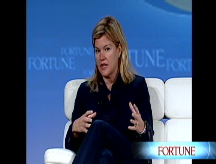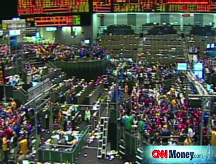Wells, Citi square off in Wachovia bid
Hours after Wells Fargo unveiled plans to buy Wachovia for $15B, Citigroup, which agreed to buy Wachovia assets Monday, demands firms terminate deal.
 |
| Citi demanded Wells Fargo terminate its proposed deal with Wachovia on Friday, claiming it is 'clear breach' of an exclusivity agreement. |
NEW YORK (CNNMoney.com) -- Wachovia and Wells Fargo unveiled plans to merge Friday, just days after Citigroup said it would acquire Wachovia's banking assets, sparking what could be an ugly takeover fight for the Charlotte, N.C.-based bank.
Just hours after the tie-up became public, Citigroup (C, Fortune 500) pressed the two firms to abandon their plans, arguing that it had entered into an exclusivity agreement with Wachovia.
Unlike Citigroup's $2.2 billion all-stock offer for Wachovia's banking business, Wells Fargo would absorb all of Wachovia's assets, including its vast deposit network, massive brokerage business and investment management division.
Wachovia shareholders would receive 0.1991 shares of Wells Fargo common stock in exchange for each share of Wachovia common stock in the transaction, valuing the deal at roughly $7 per Wachovia common share, or approximately $15.1 billion.
Top executives at both Wachovia and Wells Fargo sounded confident in a conference call with investors that the deal would go ahead as planned despite what could be a robust challenge from Citigroup.
"We think that this deal is solid," John Stumpf, Wells Fargo's chief executive, said in a joint conference call with other top company executives as well as Wachovia CEO Robert Steel.
Yet, Citigroup may have a legitimate claim to challenge the Wells Fargo deal.
A copy of the exclusivity agreement between Citigroup and Wachovia obtained by CNNMoney.com revealed that Wachovia had agreed not to seek out another bidder as well as provide information or enter talks that might facilitate a rival bid.
The agreement also indicated that there was no specified break-up fee in the deal.
Citigroup officials, who only learned of Wachovia's change of heart late Thursday, were also considering legal action, according to a source close to the discussions.
"Citi is apoplectic about this deal because what's next?" said Oppenheimer & Co. analyst Meredith Whitney, speaking at Fortune's Most Powerful Women conference Friday. "They need a big deposit base and they really needed Wachovia."
The deal also poses a challenge for regulators. A winning bid by Wells Fargo would be cheaper for the Federal Deposit Insurance Corporation, which agreed to cover any losses on Wachovia's $300 billion loan portfolio beyond the first $42 billion as part of the Citigroup purchase.
But as of Friday, Citigroup still had support of industry regulators.
"The FDIC stands behind its previously announced agreement with Citigroup," Federal Deposit Insurance Corporation Chairman Sheila Bair said in a statement, adding that it would pursue a resolution with all three companies.
Both the Federal Reserve and the Office of the Comptroller of the Currency said it was reviewing the proposed deal by Wells Fargo and the issues it raises.
News of the deal, which came just hours before the House passed the $700 billion rescue package aimed at propping up the nation's banking system, sent Wachovia (WB, Fortune 500) shares 59% higher in Friday trading.
Shares of Wells Fargo ended nearly 2% lower as Citigroup threatened to scuttle the deal. Citigroup stock finished 18% lower. Most bank stocks fell Friday after the bailout bill was approved.
Following weekend-long negotiations, Wells Fargo had reportedly walked away from talks with Wachovia over concerns about parts of Wachovia's loan portfolio, which has been ravaged by the fallout in the housing market in recent months.
Executives at Wells Fargo offered few details about what happened in the days that followed. But they said that their own team of credit experts continued to perform due diligence on previously obtained information about Wachovia's loan portfolio even after Citigroup revealed its own plan to buy Wachovia's banking operations.
After closer inspection, Stump said Wells Fargo finally felt more secure about a tie-up with Wachovia.
"We will not do any deal that we are not comfortable with," Stumpf said. "It took us that amount of time to make sure that was the case."
Wachovia's board voted in favor of the Wells Fargo's offer because they viewed it as superior to Citi's proposed deal as well as part of their fiduciary duty, according to a person familiar with the matter.
"This deal enables us to keep Wachovia intact and preserve the value of an integrated company," Wachovia CEO Robert Steel said in a statement.
The tie-up, however, comes at a cost for the San Francisco-based Wells Fargo. The company said it expected to incur about $10 billion in merger related costs. It said it would also record Wachovia's impaired assets at fair value, which could herald further writedowns.
Howard Atkins, Wells Fargo's chief financial officer, said that pre-tax losses and market adjustments from Wachovia's loan portfolio would hit $74 billion and the bulk of that would be written off shortly after the transaction closes.
In the wake of Friday's news, rating agencies Standard & Poor's and Moody's both placed Wells Fargo on watch for a potential ratings downgrade.
Still, the company said it expected the acquisition to add to earnings in the first year of operations, adding that it planned to raise $20 billion, primarily through a common stock sale to help prop up its capital position.
Unlike many of its peers, Wells Fargo has managed to ride out the credit crunch and turmoil in the housing market without taking a big hit. The company reported better-than-expected earnings for the second quarter in July.
But for months, top executives at Wells Fargo had shunned the notion of doing a large acquisition, instead stressing that they preferred to do a smaller deal, if at all.
It was only recently however, that that stance changed. In mid-September, current Wells Fargo chairman and former CEO Dick Kovacevich said he felt "like a kid in a candy store" given the number of attractive buying opportunities in the banking industry.
A Wells Fargo victory would transform the company, whose operations and bank branches are largely located in the Midwest and on the West Coast, into a dominant presence along the East Coast and in the Southeast. That would put the San Francisco-based bank squarely in competition with the likes of JPMorgan Chase (JPM, Fortune 500) and Bank of America (BAC, Fortune 500).
"This would represent a major strategic win for Wells Fargo," said David Hendler, analyst with CreditSights, in a report.
Should Wachovia shareholders and regulators approve the deal, Wells Fargo will control about $800 billion in deposits and have nearly 11,000 banking locations.
If Citigroup is not able to prevail over Wells Fargo for Wachovia, it would represent a blow to Citigroup's retail banking aspirations, whose footprint has lagged many of its biggest rivals.
Investors cheered Citigroup's decision earlier this week to buy Wachovia's banking assets. But some observers had wondered whether Citigroup could pull off the deal since it is in the process of a major restructuring after posting close to $18 billion in losses over the past three quarters.
Citigroup CEO Vikram Pandit, however, said on Monday that the purchase was more "compelling" than other deals it had considered, in part, because of Wachovia's geographic exposure.
In the last month alone, the nation's banking industry has undergone a dramatic facelift, including the failure of Washington Mutual and its subsequent purchase by JPMorgan Chase as well as Bank of America's acquisition of Merrill Lynch. ![]()



